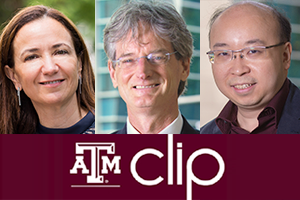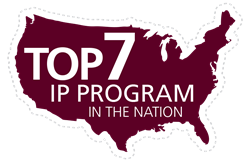 Last weekend, Professors Irene Calboli, Glynn Lunney and Peter Yu of Texas A&M University School of Law participated in the 5th Global Congress on Intellectual Property and the Public Interest. Held at American University Washington College of Law, this anniversary event brought together over 400 researchers, activists and practitioners to work on issues intersecting intellectual property and the public interest. The Center for Law and Intellectual Property at Texas A&M University School of Law was one of the event's institutional partners.
Last weekend, Professors Irene Calboli, Glynn Lunney and Peter Yu of Texas A&M University School of Law participated in the 5th Global Congress on Intellectual Property and the Public Interest. Held at American University Washington College of Law, this anniversary event brought together over 400 researchers, activists and practitioners to work on issues intersecting intellectual property and the public interest. The Center for Law and Intellectual Property at Texas A&M University School of Law was one of the event's institutional partners.
"We are very excited to have three Aggie IP professors represented in this year's Global Congress," said Yu, who directs the Center for Law and Intellectual Property and holds a joint appointment at the School of Law and the Department of Communication. "Our professors have been active at the forefront of the intellectual property law and policy debate. The Global Congress has not only provided an opportunity to share our latest research, but has also enabled us to work closely with colleagues from across the world to address difficult legal and policy challenges."
On September 28, Calboli co-organized the American University International Law Review Symposium on "Intellectual Property and Development” with Professor Peter Jaszi of American University. Featuring eminent international intellectual property scholars, this symposium explored whether intellectual property protection can serve or thwart the goal of economic, social and cultural development.
"This panel tackled some of the most controversial issues in today's debate on intellectual property law and development," said Calboli, an internationally renowned scholar of intellectual property and trade. "The event highlighted the pressing need for reforms as well as for a more nuanced approach related to the notions of openness, access and inclusiveness in order to effectively bridge the development gaps."
In the afternoon, Calboli and Yu spoke at the book launch of the Cambridge Handbook of Public-Private Partnerships, Intellectual Property Governance, and Sustainable Development, which is edited by Margaret Chon, Pedro Roffe and Ahmed Abdel-Latif. Calboli co-authored a chapter on the roles of the state and the private sector in the governing framework of geographical indications, and Yu contributed a chapter examining the human rights obligations of intellectual property-related public-private partnerships.
Lunney also launched his new book, Copyright's Excess, which was published by Cambridge University Press. The book challenges the conventional wisdom that more copyright protection will lead to more money for copyright owners, and more money for copyright owners will in turn lead to more original works of authorship. Tracking the rise and fall of copyrighted sound recordings from 1961 to 2015, the book shows that more revenue from the copyright system has actually led to fewer and lower-quality hit songs.
"Copyright's fundamental premise is that more money to artists and copyright owners will lead to more and better original works," said Lunney, who holds a joint appointment at the School of Law and the College of Engineering at Texas A&M University. "But for the U.S. recording industry over the last 50-some years, that premise has proven false."
On September 29, Yu led a workshop on his forthcoming Research Handbook on Intellectual Property and Global Development. The book brings together experts in the field to examine a wide variety of issues at the intersection of intellectual property and global development. This forthcoming handbook will be published by Edward Elgar Publishing as part of the Elgar Intellectual Property and Global Development series, which Yu edits.
Later in the day, Calboli participated in a panel dedicated to the "Global Online Piracy Study" released by the Institute for Information Law at the University of Amsterdam. The panel reflected on the findings and implications of the study, which maps the current situation related to online piracy in multiple countries. Calboli commented on the findings in four Asian jurisdictions: Hong Kong, Indonesia, Japan and Thailand.
In the afternoon of September 29 and the morning of September 30, Calboli and Lunney participated in the 7th Annual Trademark Works in Progress Colloquium organized by Professor Christine Farley of American University Washington College of Law in parallel with the ending of the Global Congress. Calboli presented her paper "Overlapping Trademark and Copyright Protection, or The Rise of the Just Dessert Theory in Trademark Law," while Lunney presented his paper "Trade Dress: Functional Is as Functional Does."
About Texas A&M University School of Law's Intellectual Property Program
 Texas A&M University School of Law currently has seven full-time intellectual property law professors. Boasting one of the lowest student-faculty ratios in this specialized area among U.S. law schools, the Texas A&M intellectual property law program has been ranked seventh in the nation in the past two years, based on peer surveys conducted by U.S. News and World Report.
Texas A&M University School of Law currently has seven full-time intellectual property law professors. Boasting one of the lowest student-faculty ratios in this specialized area among U.S. law schools, the Texas A&M intellectual property law program has been ranked seventh in the nation in the past two years, based on peer surveys conducted by U.S. News and World Report.
About Texas A&M School of Law
Texas A&M School of Law is an American Bar Association-accredited institution located in downtown Fort Worth. In 2013, the law school acquired Texas Wesleyan University School of Law and has increased faculty and students exponentially in its five-year existence. The law school ranks highly nationwide in dispute resolution and intellectual property and offers 11 clinics that introduce students to real-world applications of the law. For more information, visit law.tamu.edu.
About Texas A&M University
Texas A&M, established in 1876 as the first public university in Texas, is one of the nation’s largest universities with more than 66,000 students and more than 440,000 living alumni residing in over 150 countries around the world. A tier-one university, Texas A&M holds the rare triple land-, sea- and space-grant designation. Research conducted at Texas A&M represented annual expenditures of more than $905.4 million in fiscal year 2017. Texas A&M’s research creates new knowledge that provides basic, fundamental and applied contributions resulting, in many cases, in economic benefits to the state, nation and world. For more information, visit tamu.edu.